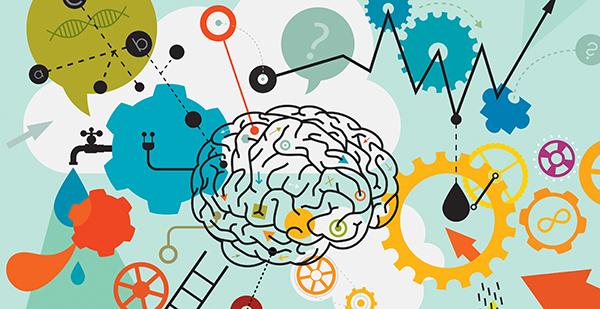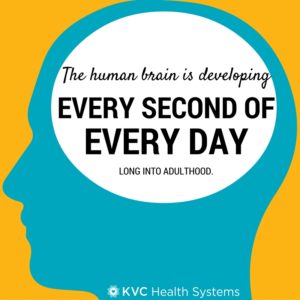The Brain Can Change… And That Changes Everything

When Ben was in third grade, things were tough at home. His single mother struggled with alcohol addiction and job instability. She loved her son, but her disconnectedness left Ben without the skills to manage his feelings of anger, sadness and worry. He sometimes lashed out at other kids. One day in middle school, Ben started yet another fight, but this time it became so violent that his mother and mental health professionals agreed that he needed psychiatric treatment. Maybe professionals could help him.
At KVC Prairie Ridge Hospital, Ben was first resistant because he was used to feeling the way he did. But over time, the clinical treatment, activities and groups helped him understand his experiences, giving him words to express his loneliness. While his mom got help of her own, his therapist helped him forge connections with adult mentors in his life. He also participated in exercises that used creativity, logic, emotion regulation and others tools to build his capacity for staying calm and making decisions that were in his best interest. Today, he’s a confident, funny and emotionally literate senior preparing for graduation.
 The fact is that the human brain is developing every second of every day, long into adulthood. Through positive interactions, the brain actually gets stronger, learns how to solve complex problems and develops resiliency to bounce back after difficult situations.
The fact is that the human brain is developing every second of every day, long into adulthood. Through positive interactions, the brain actually gets stronger, learns how to solve complex problems and develops resiliency to bounce back after difficult situations.
The opposite is also true. Adversity such as poverty or traumatic experiences, especially those that happen during childhood and adolescence, can interrupt brain development, making it more difficult for children to control their emotions, behavior and decision-making as they get older.
While some believe that people just “are who they are” and cannot be changed, neuroscience tells us that’s simply not true – and that’s great news. People can change. Brains can be strengthened. And those of us who find it difficult to manage the stresses of life – whether a child or adult, whether encountering an everyday stress or something more serious – can build the capacity to solve challenges and lead happy, healthy lives.
The Change in Mind Initiative
These topics are the core of a new initiative KVC is participating in called Change in Mind: Applying Neuroscience to Revitalize Communities. The program is led by the Washington, D.C.-based Alliance for Strong Families and Communities which is a network of hundreds of human-serving organizations.
KVC was one of only 15 nonprofit agencies selected to participate. The Change in Mind cohort is raising awareness about how life-altering toxic stress affects children and families. They’re also leading efforts to align systems and public policy with the latest science in order to make real progress on difficult social issues like poverty, substance abuse, family discord, trauma, and physical and mental health.
Several staff have represented KVC at Change in Mind gatherings including Sue Lohrbach who leads the KVC Institute for Health Systems Innovation, James Roberson who directs program services for KVC’s child and adolescent psychiatric hospitals, and Julie Burdick who manages KVC’s communications including social media.
In late March, Change in Mind came to KVC. Jennifer Jones, Director of Child and Family Systems Innovation for the Alliance, visited KVC’s headquarters in Olathe, Kansas. The site visit gave Jones a better sense of KVC’s contributions to the field in expanding trauma-informed care and promoting healthy brain development, and created opportunities for synergy with the other agencies involved.
Building Brain Capacity
 While the half-full or half-empty glass is a classic measure of attitude, the glass is also a helpful metaphor for understanding the latest neuroscience. But in the case of brain science, the emptier the glass, the better!
While the half-full or half-empty glass is a classic measure of attitude, the glass is also a helpful metaphor for understanding the latest neuroscience. But in the case of brain science, the emptier the glass, the better!
Think of the water in the glass as stress. That stress can come from serious childhood adversity like poverty, parental substance abuse, or traumatic experiences. The stress can also be everyday challenges related to difficult relationships, work or finances. Water in the glass should be kept as low as possible. This might mean avoiding negative people, reducing financial commitments, or finding a more enjoyable job.
But everyone can also make their glass bigger! The glass is the brain’s capacity to handle challenges. Simple things like going for walks in nature every day, meditating, and talking a situation over with a friend are ways to build the brain’s executive functioning, which is the ability to do things like pay attention, plan and organize, and manage time and behavior.
To help more individuals and communities, KVC is expanding its neuroscience initiative this year. That includes developing new hands-on brain development tools for professionals and families and sharing information to influence policymaking at the state and federal levels. In so doing, KVC hopes to inspire people everywhere with the simple truth that the brain can change… and that changes everything.
Are you interested in receiving helpful articles on brain development, parenting and other health and wellness topics? Join our mailing list.
Read more at www.kvc.org/brain.




